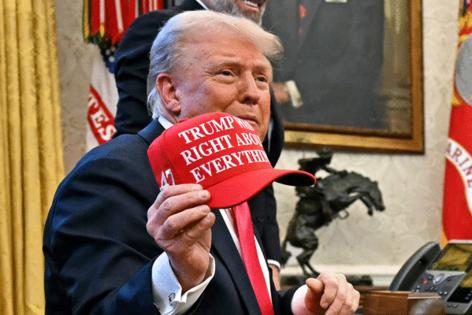Could Trump serve a third term through a VP loophole? Legal experts weigh in
Published in Political News
In a recent interview, President Donald Trump expressed interest in serving a third term — potentially by swapping places with Vice President JD Vance. But, experts say the scheme would be unconstitutional.
“A lot of people want me to do it. ... I’m not joking,” Trump told NBC News on Sunday when asked about the possibility of staying in office past 2029. He did stipulate that “it is far too early to think about it.”
The network asked about a scenario in which Vance would run for president with Trump as his running mate, only for Vance to resign and pass the reins to Trump after the election.
“That’s one (method),” Trump told NBC News. “But there are others, too.”
In response to his comments, three constitutional law experts told McClatchy News that this method would violate the Constitution.
How would it work?
This role-swapping method relies on a so-called loophole in the 22nd Amendment two-term presidential limit.
The amendment, ratified in 1951, states that “No person shall be elected to the office of the President more than twice.” It was passed in response to President Franklin Roosevelt’s unprecedented four terms in office.
So, in theory, Trump could be elected vice president before taking over as president — since the law does not explicitly ban someone from serving as the president through succession.
“The whole premise of the 22A loophole is that (Trump) can be president, he just can’t be elected president,” Brian Kalt, a constitutional law professor at Michigan State University College of Law, told McClatchy News.
‘The text is clear’
However, this potential loophole is invalidated by the 12th Amendment redefining the procedure to elect the president and vice president, experts said.
This earlier amendment, ratified in 1804, states that “no person constitutionally ineligible to the office of President shall be eligible to that of Vice-President of the United States.”
This means that, because he would have already served two terms, Trump would be barred from running as president and thus also barred from being vice president.
“The Constitution has to be read as a whole,” Mark Tushnet, an emeritus professor of constitutional law at Harvard Law School, told McClatchy News.
“In particular, the 22nd amendment has to be read together with the 12th amendment. This means that the scenario of running for vice president, winning, and the elected president resigning won’t work,” he said. “The text is clear that he is ineligible.”
Erwin Chemerinsky, the dean of University of California Berkeley School of Law, concurred, telling McClatchy News that the 12th Amendment bars Trump from running for vice president and taking over as president.
“There is no way that Donald Trump can have a third term except by a constitutional amendment or a coup,” Chemerinsky said.
Other options
Aside from amending the Constitution to change these rules — which is highly unlikely given it would need to be ratified by three-fourths of states — there are other methods Trump could try to employ in order to serve a third term, experts said.
“All of them are backdoor methods that would be of debatable constitutionality and would violate the spirit of the 22nd Amendment, but they are very real vulnerabilities,” Kalt said.
Tushnet outlined one such possibility, which he labeled “a workaround.”
In this scenario, a Trump loyalist — say Donald Trump Jr. — would run for president and pledge “to do whatever his father tells him to.”
“That’s clearly constitutionally permissible — though a tiny bit risky because the elected president does have some ‘agency’ in deciding whether to adhere to his pledge in whole or in part,” Tushnet said.
_____
©2025 The Charlotte Observer. Visit charlotteobserver.com. Distributed by Tribune Content Agency, LLC.




























































Comments